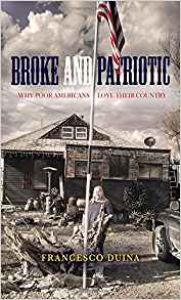Join getAbstract to access the summary!

Join getAbstract to access the summary!
Francesco Duina
Broke and Patriotic
Why Poor Americans Love Their Country
Stanford UP, 2017
What's inside?
America’s poor people suffer from US policies but still deeply love their country. Why?
Recommendation
Being broke in America is no picnic. Good jobs are scarce, the social safety net is sparse, and upward mobility is increasingly improbable. Despite all that, a significant percentage of poor Americans express deep pride in their country and scarcely question its reputation as a land of opportunity. Even flat-broke Americans praise their homeland as the best country in the world. Sociologist Francesco Duina explores this paradox and offers a revealing portrait of patriotism at the bottom of the US income ladder. While it may not come as a surprise that poor white Americans are patriotic, Duina also interviews low-income African-Americans who, despite their financial struggles and America’s fraught racial history, believe the United States is the best country in the world. To his credit, Duina doesn’t overreach in this clear, readable study. He limited his travels to Alabama and Montana and interviewed only poor Americans who described themselves as patriots. Thanks to this sharp focus, he brings back eye-opening results – along with the unfortunate conclusion that poor patriots often prove uninformed or inarticulate. Dishearteningly, Duina’s interviews reveal no shortage of ignorant and illogical opinions. He delves into psychoanalysis, presenting the theory that love of country can serve as a coping mechanism. Duina suggests that when everything else in life is difficult, poor patriots take comfort in believing they are citizens of the world’s greatest nation. While this report isn’t exhaustive, it provides a welcome addition to the growing genre of titles about the disconnect between Americans’ economic fortunes and their political beliefs. Thomas Frank kicked off this genre in 2005 with What’s the Matter with Kansas? Since then, other authors have weighed in with worthy and illuminating works such as White Working Class and Strangers in Their Own Land. Duina’s open-minded, thorough approach is refreshing, especially in that he brings no discernible ideological position to his study. And he offers a great deal of compassion to his subjects.
Summary
About the Author
Francesco Duina, a professor of sociology at Bates College, also wrote Winning: Reflections on an American Obsession.

















Comment on this summary